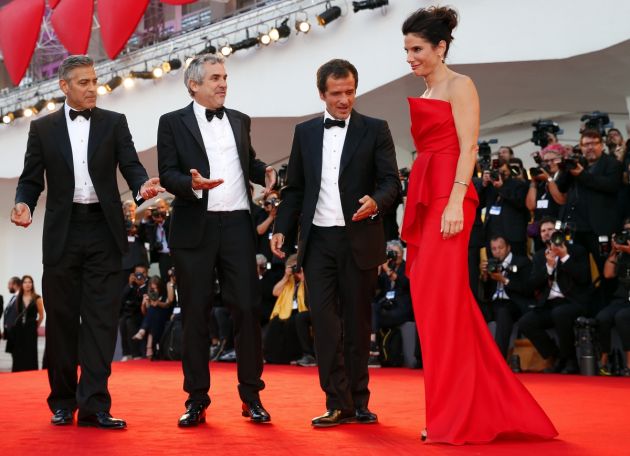Christian critics laud new space adventure 'Gravity'

Christian reviewers, who are often sparing in praising Hollywood productions, are applauding the new space adventure "Gravity" for its spiritual themes.
Set in the lonely void many miles above earth, the film portrays the desperate attempts to survive by two astronauts set adrift after their space shuttle is destroyed by a freak accident.
The Warner Bros. astronaut adventure starring starring Sandra Bullock and George Clooney clinched the top spot at the U.S. box office for a second succesive weekend, earning $43.2 million and raising its domestic total to $122.3 million, The Associated Press reported Tuesday.
"Director Alfonso Cuarón's 'Gravity' is being hailed as perhaps the best space-centric flick since 2001: A Space Odyssey, " said Paul Asay in a review of the film in the Washington Post.
Asay is a reviewer for the Christian movie site Plugged In.
"The story is taut and relentless", he said. "The special effects are amazing. It's both intimate and epic, and I imagine we'll still be talking about this flick come Academy Awards season.
"But in the midst of this straightforward story of two people trying to survive in the not-so-friendly confines of space, there's a resonant, deeply spiritual message at play."
In "Gravity," Ryan Stone (Sandra Bullock) is a scientist on her first voyage into space, while Matt Kowalski (George Clooney) is a veteran on his last mission.
Both have experienced grief and loneliness. Stone lost a child to an accident, while the divorced Kowalski's wife cheated on him.
Already in the depths of sadness because of their earthly trials, the two are now all the other has as they try to reach the International Space Station (ISS), a 100-mile trek through the vacuum around them.
All the other astronauts who had accompanied them have died in an inadvertent storm of debris caused by a satellite demolished by a Russian missile.
Things become even more desperate for Stone when Kowalski untethers himself from her so she can survive. He had kept her from panic with his good-natured banter and encouragement.
Kowalski floats to his death into space, continuing to exhort Stone to carry on.
She does try to keep going - for a time. Stone even makes it to the ISS and boards a Soyuz spacecraft.
After a while, however, with her hopes fading, she is ready to give up and just go to sleep.
In the most notable scene in the film, Stone expresses great regret over her fate.
"No one will mourn for me," she says." No one will pray for my soul. I've never prayed. "
She is as empty and alone on a spiritual level as the environment outside her capsule.
It is at this point that Kowalski shows up at the window and enters the small space ship. He tells Stone it is time to go home.
Then, Kowalski disappears. His unexpected appearance has been a kind of "visitation."
It gives Stone the will to go on. The now energized scientist tells the unseen Kowalski to greet her daughter and tell her not to worry about a lost shoe she had been so concerned about.
Then, she does everything she can to get back to terra firma.
Christian critics are praising this aspect of the film.
In the Washington Post review, Asay described Stone's journey as a kind of rebirth and likened it to mythical stories in which heroes have gone to hell and back.
"But the most powerful (and, in my belief, the truest) of these stories is that of Jesus, who died and (as is written in the Apostle's Creed) descended into hell, and rose again to bring us all the possibility of new life," Asay wrote.
"Many Christian literary figures, from Dante in his Divine Comedy to "Christian" in John Bunyan's Pilgrim's Progress, make their own descents into hell or hell-like environs in order to make the trip to salvation.
"In Christianity, we all believe that we live in death - even when we're still physically very much alive - until our belief in Jesus, and his love for us, pulls us out of it. It's one of the central paradoxes of our faith: In life, death. In death, life."
Eric Hann, Cinema and Media Arts professor at evangelical Biola University, told the Christian Post (CP) he was not sure if he would make the claim the film gestures toward Christ himself, but that it could be argued it portrays a God who interacts with events and who does miracles.
He also argues that the film features how God gives new meaning to a suffering person.
Hann notes that the near-death experiences does not address the inner emptiness of Stone, but that the visitation in the Soyuz capsule does.
"Only a very personal engagement - the near-death visitation - gives Ryan new purpose and a drive to survive. I don't want to say it's theistic, but maybe divine about the idea that what changed her mind was very personal - it was another person," Hann opined in CP.
"I don't know that Christ was explicitly stated, but possibly implicitly stated," the Biola professor said.
In a Catholic News Agency (CNA) review, Carl Kozlowski wrote even though the film portrays two loners, it is not without hope
"Rather, it is a story of transformation and transcendence, as this coldly calculating woman of science acknowledges that she never learned how to pray, only to prove true the adage that there are no atheists in foxholes," he said.
"That spiritual battle gives 'Gravity' an added powerful kick for believers, continuing what appears to be a trend in recent weeks of mainstream Hollywood movies featuring main characters who rely on their faith to endure tremendous challenges."
Kozlowski also notes that, unlike other movies of this kind, "Gravity" portrays a spiritual journey at a higher level, but without immorality.